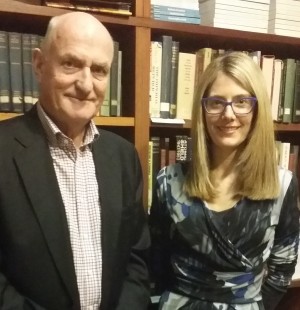Resettlement from Nauru: a cautionary tale
On Tuesday 1 September, Jane McAdam addressed a substantial crowd at Glover Cottages about Nauru and refugees. With a doctorate in law from Oxford, Jane is Scientia Professor of Law and Director of the Andrew and Renata Kaldor Centre for International Refugee Law at UNSW. She has published widely on international refugee law and forced migration.
Jane told a depressing tale. From 1920 (before which Nauru was a German possession) until 1968, Australia, New Zealand and the UK Phosphate Commission were exploiting phosphate reserves on Nauru. This generated billions of dollars of revenue, a proportion of it going into Nauruan coffers. But most of this was lost through corruption and mishandling. The United Nations regarded the phosphate miners as having a moral obligation to re-settle Nauruans once the phosphate ran out. Over the years, several Australian governments beginning with those of Robert Menzies came up with a number of proposals, including giving Nauruans an Australian island, re-settling them in Australia, or distributing them among other Pacific islands. But Hammer DeRoburt, Nauru’s founding president, his successors, and the Nauruan people themselves, opposed all proposals on the grounds that they would lose their identity if dispersed or relocated. So on Nauru, now a despoliated island of which only the rim remains free from mining depredation, 10,500 people continue to pursue their lives. Added to its problems, Nauru has reluctantly become a prison camp along with Manus Island in Papua New Guinea for boat people attempting to reach Australia. The Abbott government is coy about details, but unofficial estimates are 1,200 refugees on Nauru and around 950 on Manus. At colossal and disproportionate expense, four from Nauru have in the last few days been relocated in Cambodia. According to sources available to Jane, the refugees on Nauru (and Manus) have well-found fears of being assaulted and raped by disgruntled and unsympathetic locals and, allegedly, some guards. Resettlement among the Nauruan population seems impossible. The culture is alien and jobs are unavailable. Single male refugees complain of being treated like animals with no future, no meaning and no hope. Some say that in their own countries, the Taliban or ISIS would kill them quickly by cutting their throats. But on Nauru, they are being killed slowly. Meanwhile, the commercial company Transfield and its affiliate Wilson Security, have renewed their multi-million contract with the Australian government to continue to administer the camps for the next five years. The situation is intolerable, but relief would appear to be a long way off. In response to a question, Jane said it is very difficult to find out whether refugee flows to Australia have remained strong, constant or have tapered off as a result of the harsh reality on Nauru and Manus. Whether more or fewer refugees are drowning at sea cannot be discerned from government statements. Such statistics are said to be part of ‘on water’ operations.
Report prepared by Richard Broinowski
